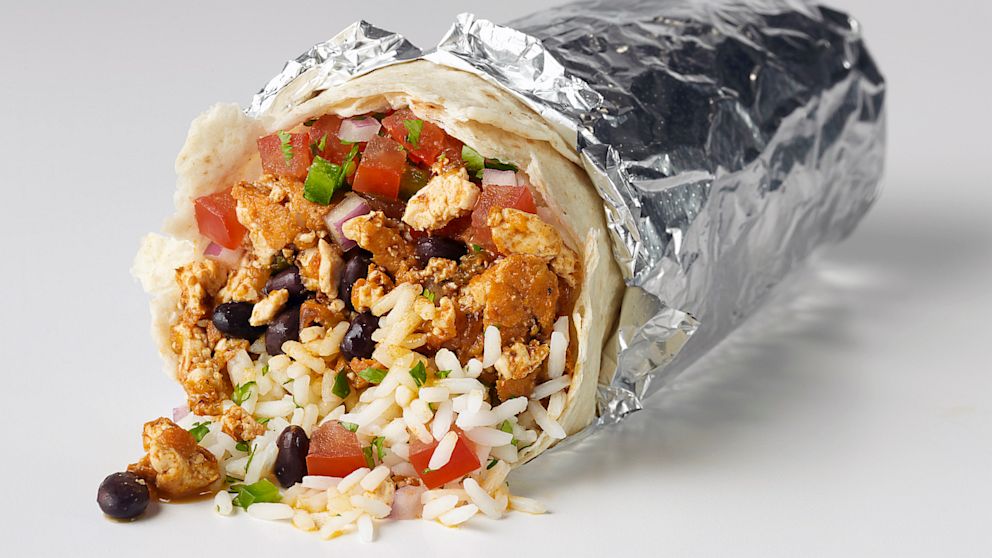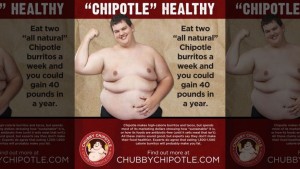Chipotle Mexican Grill, viewed by millions of loyal customers as a “healthy” alternative to McDonald’s, Burger King, Wendy’s and other fast-food restaurant chains, is suddenly on the defensive, fighting off attacks against its “food with integrity” slogan and the quality of its ingredients.
“But the bigger you get, it opens the door for attacks from critics, watchdogs and skeptics.”
A new advertisement from ChubbyChipotle.com – a campaign backed by the Center for Consumer Freedom, a Washington, D.C.-based nonprofit that lobbies for food companies – claims Chipotle’s soy-based Sofritas and pinto beans contain more estrogen than beef raised with hormones.
According to GrubHub data, the average order at Chipotle contains 1,070 calories. (Chipotle)
The company is also fending off a range of discussions about whether its high-calorie menu can actually be healthy, and a class-action lawsuit that accuses it of being untruthful about its “GMO free” menu.
Now the lawsuit and the ongoing strikes from special interest groups have industry analysts wondering if the Chipotle brand’s healthy image can survive.
“Chipotle is trying to do something great for consumers,” says Darren Tristano, executive vice president of Technomic, a research and consulting firm that focuses on food and related products and services. “But the bigger you get, it opens the door for attacks from critics, watchdogs and skeptics. I think any negative campaign has the potential to have a negative impact on a brand.”
Since the chain’s founding in 1993, Chipotle has successfully branded itself as a company that provides healthy fast food and engages in more ethical business practices than its competitors. The strategy has attracted a growing number of consumers looking for fewer artificial ingredients in their food, and it has made Chipotle the second-fastest-growing chain in the U.S., with double-digit sales growth over the past two years, according to the strategic market research firm Euromonitor International.
In April, Chipotle announced that it had phased out genetically modified ingredients from its menu, becoming the first major fast food chain to do so. The chain also reinforced its commitment to its core values earlier this year when it proactively removed its popular carnitas from menus at hundreds of its restaurants because a pork supplier wasn’t meeting the company’s standards.
But in recent months, cracks in Chipotle’s image have started to form.
In February, the New York Times reported that the average Chipotle order contains over 1,000 calories – more than a Big Mac and large fries at McDonald’s – spawning new debate on Chipotle’s claims of healthfulness.
And in August, a class-action lawsuit was filed that accuses Chipotle of engaging in deceptive marketing practices. The plaintiffs say that while Chipotle claims its food is GMO-free, it has disclaimers on its website that say there may be trace amounts of GMO content in some of its food. The suit also attacks the chain for serving Coca Cola products, which contain high fructose corn syrup — a GMO ingredient. Lead plaintiff Colleen Gallagher says Chipotle also is violating the Federal Food, Drug and Cosmetic Act by misleading, and ultimately deceiving, diners into paying more for food that they are led to believe is locally sourced or ethically raised.
Recently, buoyed by the New York Times article and the press garnered by the class-action lawsuit, a series of ads has appeared on ChubbyChipotle.com that has the potential to do real damage to the brand. Since last month, the Center for Consumer Freedom, a non-profit lobby that has received donations from companies including Coca Cola and Wendy’s, has been running full-page ads in major newspapers that include images of overweight people with the tagline, “Eat two ‘all natural’ Chipotle burritos a week and you could gain 40 pounds in a year.” The campaign also attacks Chipotle for its “hypocritical” stance on GMOs and its use of ingredients that contain a lot of hormones.
Tristano says most Chipotle fans are likely to remain loyal to the chain despite the attacks, but there are diners who could be turned off. “A younger consumer who places a high degree of trust in food companies may be swayed by these so-called smear campaigns,” he said.
The Center for Consumer Freedom says on its website that says on its website that it “is supported by restaurants, food companies and thousands of individual consumers.” But the organization will not disclose who’s behind Chubby Chipotle, other than to say there is not one donor or industry supporting the effort.
Chipotle spokesman Chris Arnold told FoxNews.com that CCF’s ads are “nonsense” and nothing more than a smear campaign launched on behalf of a “cadre of anonymous big-food backers.” Rick Berman, CCF’s founder, acknowledged that one of the organization’s first campaigns was to fight for restaurants’ rights to maintain separate smoking sections for consumers, rather than a blanket ban – with money donated by tobacco giant Philip Morris.
“Today,” Arnold said via email, “it’s food and food issues that are in the Center’s crosshairs, though it’s very much the same playbook they used in defense of the tobacco industry. They were wrong then, and they’re wrong now.
“Clearly, Chipotle has reached a point where a company, or group of companies, feels threatened by what we are doing, and they are lashing out with this attack from the Center.”
CCF says Chipotle is shying away from addressing the controversy directly. “Chipotle’s attempt at distraction by referencing tobacco seeks to avoid answering our criticism that they are promoting discredited food science,” Berman said in an emailed statement.
Bad publicity is never good, but Emily Balsamo, a food industry analyst with Euromonitor International, says the attack campaign and the pending lawsuit probably won’t have an effect on the average consumer.
“The kind of person who is really into Chipotle is not necessarily trying to avoid GMOs at all costs,” she said. “It’s a young person who is looking for a fast meal that seems healthier than McDonald’s.”
But Tristano warned that a segment of the market may start to question Chipotle’s core values after taking a closer look at some of the issues.
“With Chipotle, we’re talking about an incredibly loyal fan base, but a small group of consumers who once trusted [Chipotle] may doubt the brand is living up to its ethical standards claims,” he said.
Arnold said he believes the chain has become a target of critics because it takes a different approach to fast food.
“Chipotle has always been willing to take positions on issues in food, and some of those positions (including our position on GMOs) have been somewhat controversial. But we take positions and we stand by them publicly,” he said.
It’s a message Chipotle continues to spread. Last week, the chain released an ad for its annual Halloween event, Boorito, a fundraiser for the Chipotle Cultivate Foundation, which promotes and supports better farming. While not mentioning Chipotle’s critics, the spot tries to silence them with “Cheapotle” — a fictitious, additive-filled Chipotle rip-off restaurant that tries to serve a customer a chicken rice bowl with additives like disodium guanylate and disodium inosinate.
Tristano says Chipotle has to make sure its core customers continue to believe in its product as it grows. “They’ve always relied more on word of mouth than traditional advertising,” he said. “You have to be even more careful that you’re standing firm in the wake of these issues.”
But Balsamo says the attacks are merely a brief public relations crisis, and that the company is handling it well so far.
“There might be a bit of a backlash in the media, but I don’t think these claims are really going to hurt Chipotle in the long run since it’s growing so fast,” she said.



